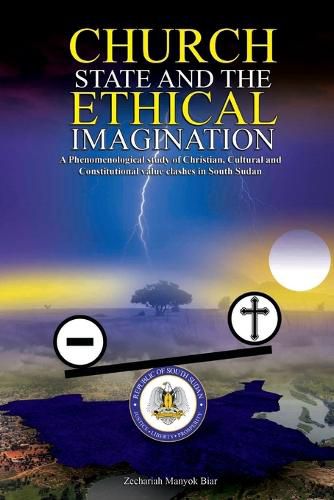Readings Newsletter
Become a Readings Member to make your shopping experience even easier.
Sign in or sign up for free!
You’re not far away from qualifying for FREE standard shipping within Australia
You’ve qualified for FREE standard shipping within Australia
The cart is loading…






This title is printed to order. This book may have been self-published. If so, we cannot guarantee the quality of the content. In the main most books will have gone through the editing process however some may not. We therefore suggest that you be aware of this before ordering this book. If in doubt check either the author or publisher’s details as we are unable to accept any returns unless they are faulty. Please contact us if you have any questions.
South Sudanese have good laws on papers, but their implementations differ with what the law
stipulates. One of these good laws is the separation of religion and state. In Church, State and
the Ethical Imaginations, Zechariah Manyok Biar explores what lies behind discrepancies
between written laws and their implementations in South Sudan. He comes up with a new
concept of central value systems to see if it can explain factors that contribute to
inconsistencies in implementations of legal provisions such as separation of religion and
state. Central value system is a conservation value composed of conformity, security and
tradition.
The author shows that this book is important in the sense that it introduces a concept
that explains why South Sudanese have good written laws but rarely implement them as
stipulated. The book will also help non-South Sudanese readers understand discrepancies in
implementations of legal provisions in their respective contexts. It is likely that both
conservatives and liberals employ conservation values of conformity, security and tradition to
protect whatever values they cherish. For example, liberals may require conformity from their
members to secure or protect the main values in their liberal tradition. Similarly,
conservatives would employ central value systems to shield cherished conservative values. It
is probable that the conservation value constitutes a central value system for any person or
group of any persuasion or school of thought. It resists penetration from new values trying to
change cherished values. In South Sudan, central value systems protect the values of power
and harmony. Theology in the context of South Sudan would thus be a theology of harmony.
Its base is the Trinitarian God, eschatological in orientation and secular in responsibility. The
originality of this study is in demonstrating that conservation values form central values that
direct how people react to values that they are uncomfortable with, regardless of whether they
are conservatives or liberals.
$9.00 standard shipping within Australia
FREE standard shipping within Australia for orders over $100.00
Express & International shipping calculated at checkout
This title is printed to order. This book may have been self-published. If so, we cannot guarantee the quality of the content. In the main most books will have gone through the editing process however some may not. We therefore suggest that you be aware of this before ordering this book. If in doubt check either the author or publisher’s details as we are unable to accept any returns unless they are faulty. Please contact us if you have any questions.
South Sudanese have good laws on papers, but their implementations differ with what the law
stipulates. One of these good laws is the separation of religion and state. In Church, State and
the Ethical Imaginations, Zechariah Manyok Biar explores what lies behind discrepancies
between written laws and their implementations in South Sudan. He comes up with a new
concept of central value systems to see if it can explain factors that contribute to
inconsistencies in implementations of legal provisions such as separation of religion and
state. Central value system is a conservation value composed of conformity, security and
tradition.
The author shows that this book is important in the sense that it introduces a concept
that explains why South Sudanese have good written laws but rarely implement them as
stipulated. The book will also help non-South Sudanese readers understand discrepancies in
implementations of legal provisions in their respective contexts. It is likely that both
conservatives and liberals employ conservation values of conformity, security and tradition to
protect whatever values they cherish. For example, liberals may require conformity from their
members to secure or protect the main values in their liberal tradition. Similarly,
conservatives would employ central value systems to shield cherished conservative values. It
is probable that the conservation value constitutes a central value system for any person or
group of any persuasion or school of thought. It resists penetration from new values trying to
change cherished values. In South Sudan, central value systems protect the values of power
and harmony. Theology in the context of South Sudan would thus be a theology of harmony.
Its base is the Trinitarian God, eschatological in orientation and secular in responsibility. The
originality of this study is in demonstrating that conservation values form central values that
direct how people react to values that they are uncomfortable with, regardless of whether they
are conservatives or liberals.